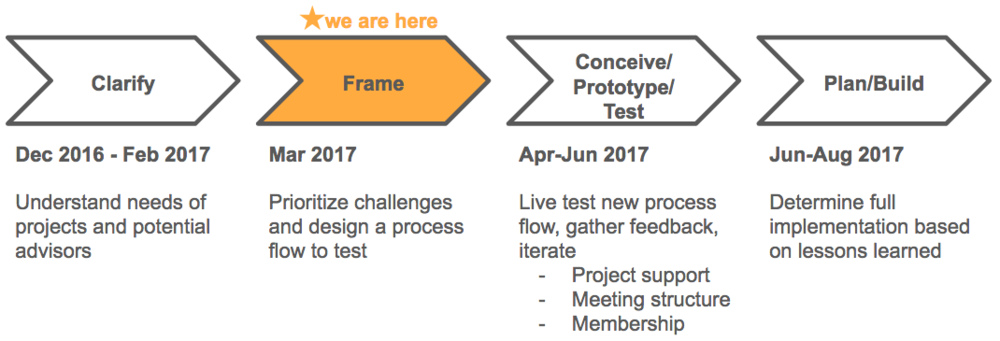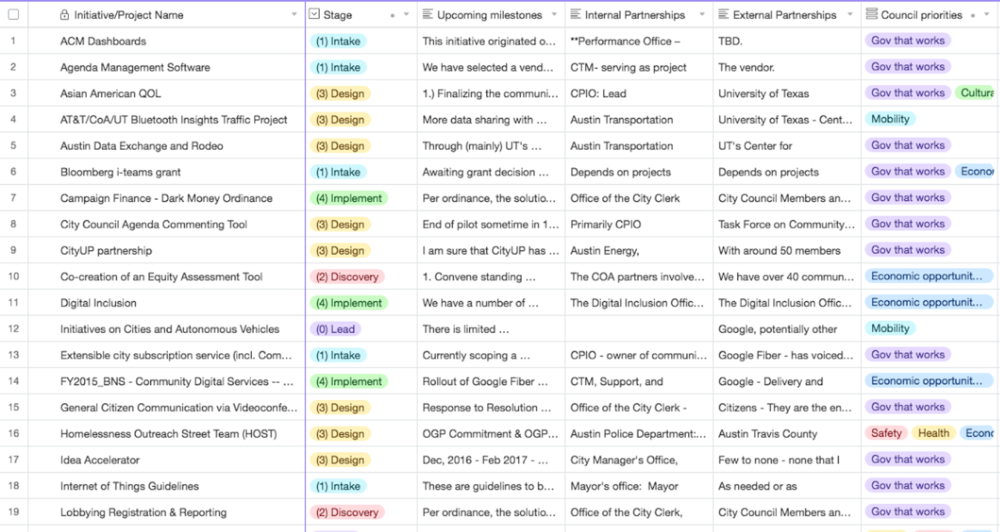March 2017 update - Redesigning Open Governance
Insights to-date on how we might support open government and smart cities projects
This is the start of a series of monthly updates on the City's effort to redesign how we support opengov/smart cities projects (OGP commitment 3). This month's update includes insights we've identified from research to date as well as next steps for designing a revamped process for supporting these projects. For background on the project, check out this summary of the opportunity, as well as this documentation of how we identified the challenge.
Where we are now
Since the beginning of the year, our team has been focused on understanding the needs and challenges facing the City's open/smart projects and the people who work in and around them to make them successful. We're gathering insights from this research (in the "Clarify" phase below) to articulate the challenges we're trying to solve in this area of "open governance," as well as some principles that should guide our way.

The research phase has involved two parts:
1. Inventorying open/smart projects: We are compiling a list of more than 40 projects the City is involved in that reflect the open government principles of transparency, accountability, citizen participation, and technology innovation (including the multitude of "smart cities" projects that use big data and sensors to optimize public services). Starting with an initial list, we asked City colleagues to provide more information on their projects, including:
- Project stage (where the project is currently, from yet-to-be-defined opportunity to implementation and closeout)
- Upcoming milestones
- Internal and external partners
- What the project needs to be successful or maximize results
- How the project might benefit from executive involvement (resources, authorization, legitimacy)

We've been analyzing this data to see patterns in the types of needs, areas of expertise needed, and how they map to the City Council's emerging strategic outcome areas. We will publish this inventory as well as our analysis in the near future. Stay tuned...
2. Talking with subject matter experts, project leads, and stakeholders: We met with 25 individuals inside and outside of the City government that interact with open government in some way:
- City staff working on open government challenges (8 people)
- City staff that can advise on a domain relevant to open government, e.g., information security, privacy, records management, community engagement (15)
- Public stakeholders that want more transparency and involvement in City projects (2)
These conversations helped us identify what project teams need, how subject matter experts might advise projects, and how public stakeholders want to engage with City efforts.
Insights to date: Guideposts for how we should support opengov projects
Out of the research, we've identified a number of principles that should inform how the City--specifically the Open Government Operating Board--supports open government projects. We term these principles "guideposts"--like the signs that point you in the general direction of where you want to go, but don't give you step by step instructions. We don't have the exact route yet, but these principles point us in the right direction. We presented these guideposts to the Open Government Operating Board on March 9, 2017.
We should also note that many of these guideposts are lessons learned and success stories from the City's open data program, which began with a management directive but evolved into a growing network of open data practitioners powered by templates, assistance, and helpful resources.
Guidepost 1. Provide guidance that empowers, not compels. The City of Austin has many existing governing entities that direct work, make resourcing decisions, set policy, and provide guidance. Here we differentiate between administrative policy, which tells staff what they must do or cannot do (e.g., purchasing rules), and guidance, which involves tools that aim to help staff accomplish a goal (e.g., a how-to guide for purchasing). Staff we talked to told us that they want more guidance--more actionable resources they can adapt and use in a proactive way, such as how-to guides, decision trees, evaluation frameworks.
Guidepost 2. Make policy and guidance easy to use. Whether we are providing administrative policy or guidance, we need to make it usable in the context of a project. For example, the City issued in 2016 an administrative bulletin that lays out rules for collecting and handling personally identifiable information (PII). However, staff mentioned that many are not aware of this policy, nor are projects using it that may involve sharing data with PII (such as "smart cities" initiatives). There is an opportunity to translate policies like this--often written in legal form (and justifiably so)--into tools staff can easily use in the flow of a project. In the case of PII policy, examples would include decision trees for whether to collect PII in the first place, online forms for reporting incidents, and checklists for how to manage PII when transferring data.
Guidepost 3. Help projects find out what they don’t know -- early. One staff member told us about a project that was a year into planning when they realized they would not be able to move forward with the procurement approach they had planned on. They had to go back to the drawing board because they didn't have the right people at the table. By introducing an emerging project with the right sets of expertise it will need, we can at least mark for the issues it will have to address at different points. For example, opportunities that involve data sharing between the City and external partners could go through a structured intake process that pairs them up with internal experts on information security, privacy, and records management. The earlier we can identify and bookmark challenges a project will have to address, the greater the chance of successfully addressing them.
Guidepost 4. Enable “boundaryless perspective” across all levels of the organization. Collaboration is a value that the City invests in teaching to emerging leaders across departments. There is a strong desire from City staff to instill this "boundaryless perspective" at all levels of the organization--to enable junior and mid-level staff to connect with one another and see how their work connects. The knowledge of how programs in one department have implications for programs in another enables everyone to make more informed decisions. Creating an online resource to track project progress (another of the City's open government commitments) will also contribute to greater cross-departmental collaboration.
Guidepost 5. Enable projects to engage this group and its advisors easily. This project focuses on using the Open Government Operating Board to give open/smart projects the help they need to succeed. This involves working in the open in an accessible way so that City staff can access the help it provides.
Guidepost 6. Help advisors connect to projects that need their help. Many of the previous guideposts deal with helping projects access experts across the City in such areas as information security, privacy, and community engagement. On the flip side, we heard from staff in these advisory roles that they would benefit from having a "funnel" to identify high-priority projects that need their consultation. The Open Government Operating Board can play a role in helping prioritize projects for these areas of expertise across departments.
Next steps
The project is shifting into design mode, to figure out what process flows and operational details we want to test to achieve these guideposts outlined above. To continue the metaphor, it's time to translate guideposts into a route with directions. Here is where we are headed next:
- Increase awareness of open and smart projects across departments. We plan to publish the inventory of open/smart projects by the end of March. This ties in with the kickoff of the design of a project tracking tool we can use across different City efforts for greater transparency and participation.
- Design and test revamped OpenGov Board process flows and operational details (April-June). Traditionally in the public sector, if we wanted to improve our internal governance, we'd start by rewriting the charter. Instead of this approach, we're testing to see what activities and processes work, then rewriting procedure the organization can sustain over time. This will involve some business model design, testing of technology platforms, prototyping different meeting formats, and figuring out the right staff roles to help the whole thing run.
Questions? Thoughts to share?
Shoot us a note at our email, innovation@austintexas.gov.

